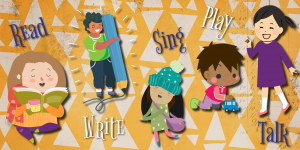
There are many skills and abilities we need to have to be successful in life. Our brains and bodies start learning many of those skills and abilities quite literally from birth. Linda Groves Gillespie, in their article “Rocking and Rolling: It’s Never ‘Just Play’”, talks about the six Cs that are developed and strengthened through play:
- Collaboration
- Communication
- Critical Thinking
- Creative Innovation
- Confidence
- Content
In the article, Gillespie describes a play situation between two toddlers and explains how each of these concepts applies to the different things the kids do and say during their playtime.
Babies
Singing songs with your baby, doing lap bounces, and of course providing plenty of baby toys to your child are all great ways to incorporate play. A simple game of “Peek-A-Boo” is fun, but did you know that it also helps develop baby’s sense of object permanence, considered an important milestone in human development?
Another playful song that we’ve done in our Baby Storytimes is “Bumpin’ Up and Down in My Little Red Wagon.” If your child is too young to sit up on your lap for this, you can hold them in your arms and gently move them left or right when the wagon “tips over.” If they’re old enough to sit on your lap comfortably and have sufficient head/neck control, sit them on your lap facing you (babies love to see your face!) and gently move your legs up and down to the rhythm.
Doing this rhyme together with your child is a great form of play and strengthens the bond you have with them which helps strengthen their sense of confidence as they grow.
Bumpin’ Up and Down
Bumpin’ up and down in my little red wagon
Bumpin’ up and down in my little red wagon
Bumpin’ up and down in my little red wagon
Won’t you be my darlin’
One wheel’s off and the wagon tipped over (tip baby gently to the side)
One wheel’s off and the wagon tipped over
One wheel’s off and the wagon tipped over
Won’t you be my darlin’
Toddlers
Playtime with toddlers does not require expensive toys. I have heard many times over many years from my parents that some of my very favorite toys as a toddler included our 1970s laundry basket and my mom’s Tupperware measuring cups and bowls.
Making a batch of pancakes? Give your child a plastic bowl, measuring cups, and a plastic spoon and have them pretend to make pancakes along with you. You can talk to them about the different measurements (1/4 cup, ½ cup, etc) which will strengthen their vocabulary and introduce them to early math concepts (be sure to point out the numbers on the measuring cups). Ask them open-ended questions such as “What should we add next?” to encourage talking. Giving your child these tools with something as simple as making their own pretend pancakes helps strengthen their confidence and their sense of symbolic thinking (the “pretend” part). Doing this together with your child also helps them develop the skill of collaboration, a skill that is as important now as it has ever been.
Preschoolers
As it does with babies and toddlers, play helps support the development of a ton of skills such as motor development and critical thinking.
Have you ever given your preschooler a bottle of bubbles and bubble wand? Playing with bubbles at this age is a great way to develop hand eye coordination. Did you know that talking about bubbles can also be a talk about science and critical thinking? The next time you blow bubbles with your child, ask them open-ended questions about how they think bubbles “work.” This is a great way to hear their thoughts and get them to think critically while slipping in some science vocabulary when you talk to them (surface tension!)
Need some additional ideas? Reserve these books with your Pima County Public Library card.
-Annie, Children's Librarian at Dusenberry-River Library
 Read, Write, Talk, Sing, Play!
Read, Write, Talk, Sing, Play!
Play comes so naturally to children and is an essential element to lifelong success. When children play, they are practicing and perfecting early literacy and life skills!
Read more about early literacy and how you can make a difference in your child's life.

